Muskmelon seeds are a hidden treasure of nutrition that can significantly improve your overall well-being. Packed with essential nutrients like vitamin C, vitamin A, dietary fiber, and potassium, these seeds offer a wide range of health benefits. Whether you’re looking to support heart health, boost your immune system, or promote hydration and weight management, muskmelon seeds are a delicious and nutritious addition to your diet.
Key Takeaways:
- Muskmelon seeds are rich in essential nutrients like vitamin C, vitamin A, dietary fiber, and potassium.
- They support heart health, promote hydration and weight management, and boost the immune system.
- Incorporating muskmelon seeds into your diet is an easy way to enhance your overall well-being.
- Explore creative ways to enjoy muskmelon seeds, such as in fruit salads, smoothies, or grilled as skewers.
- Choose organic muskmelon seeds whenever possible to support sustainable farming practices.
What Are Muskmelons?
Muskmelons, also known as Cucumis melo, are a type of melon that comes in various varieties such as cantaloupes, honeydews, and casabas. These fruits are widely cultivated for their refreshing taste and versatile culinary applications. Each variety has its own unique flavor profile, but all muskmelons share the characteristic of having a fragrant aroma and sweet, juicy flesh.
These muskmelon varieties are popular worldwide and are enjoyed in both raw and cooked forms. Cantaloupes, with their orange flesh and netted rinds, are particularly favored for their sweet taste. Honeydews, known for their pale green flesh and smooth skin, have a milder flavor. Casabas, on the other hand, have a pale yellow flesh and a sweet, honey-like flavor.
Muskmelons are not only delicious but also highly nutritious. They are low in calories, making them a perfect addition to a healthy diet. Muskmelons are packed with vitamins A and C, as well as potassium and dietary fiber, which contribute to overall health and wellbeing.
What Are Muskmelons?
Packed with Essential Nutrients
Muskmelon seeds are a nutritional powerhouse, offering an array of essential vitamins, minerals, and antioxidants. They are rich in vitamin C, which boosts the immune system and aids collagen production for healthy skin. Additionally, muskmelon seeds provide a significant amount of vitamin A, promoting good vision, healthy skin, and mucous membranes. They are also a great source of dietary fiber, potassium, vitamin K, folate, and magnesium, all of which contribute to overall health and well-being.
The Nutritional Profile of Muskmelon Seeds
Table:
| Nutrient | Amount per 100g |
|---|---|
| Vitamin C | 34mg |
| Vitamin A | 19mcg |
| Dietary Fiber | 3.6g |
| Potassium | 499mg |
| Vitamin K | 6.4mcg |
| Folate | 23mcg |
| Magnesium | 91mg |
These nutrients play crucial roles in maintaining various bodily functions. Vitamin C acts as a powerful antioxidant, protecting cells from damage caused by harmful free radicals. It also supports the production of collagen, a protein that helps maintain the elasticity of the skin and connective tissues. Vitamin A is essential for healthy vision, while dietary fiber aids digestion and promotes a healthy gut. Potassium helps regulate blood pressure and supports heart health, while vitamin K plays a key role in blood clotting and bone health. Folate is important for DNA synthesis and cell division, and magnesium is involved in more than 300 enzymatic reactions in the body.
By incorporating muskmelon seeds into your diet, you can easily boost your intake of these essential nutrients and enhance your overall health and well-being.
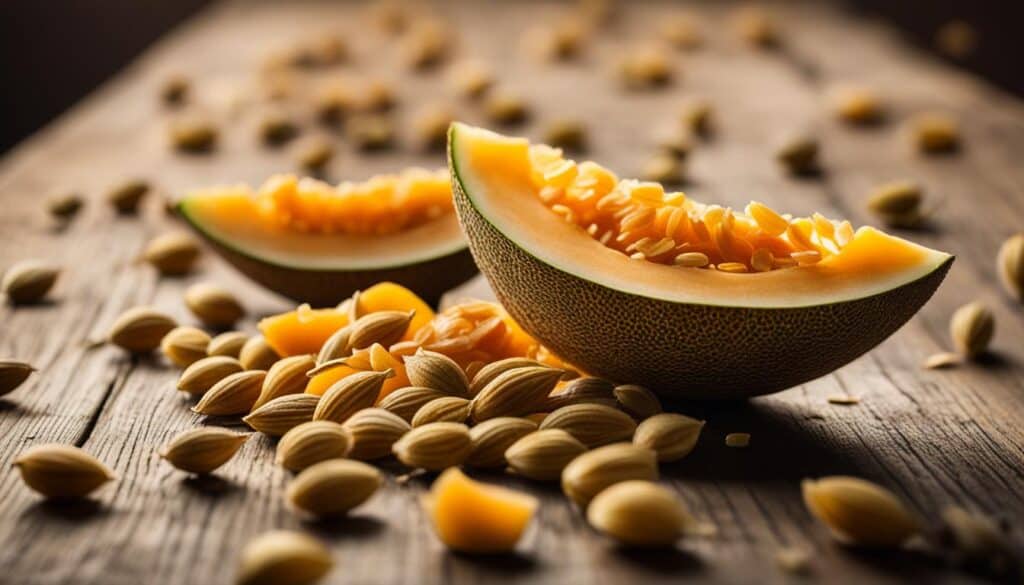
Health Benefits of Muskmelon Seeds
Muskmelon seeds offer a multitude of health benefits when incorporated into your diet. These nutritious seeds, packed with essential vitamins, minerals, and antioxidants, can contribute to improved hydration, weight management, heart health, skin health, and immune function.
One of the key benefits of muskmelon seeds is their high water content and fiber, which promote hydration and support weight management. The potassium content in these seeds helps regulate blood pressure, contributing to a healthy heart. Additionally, the abundance of vitamin C and vitamin A in muskmelon seeds promotes healthy skin and supports eye health.
“Including muskmelon seeds in your diet is an easy way to enhance the nutritional value of your meals and snacks.”
The fiber in muskmelon seeds aids in digestion and supports a healthy gut. It also helps maintain a feeling of fullness, which can be beneficial for weight management. Moreover, the high vitamin C content in muskmelon seeds strengthens the immune system, boosting overall well-being.
The Nutritional Profile of Muskmelon Seeds
| Nutrient | Amount per 100g |
|---|---|
| Vitamin C | 34.8mg |
| Vitamin A | 469IU |
| Dietary Fiber | 3.6g |
| Potassium | 215mg |
Table: Nutritional profile of muskmelon seeds per 100g serving.
As seen in the nutritional profile table, muskmelon seeds are a rich source of vitamin C, providing 34.8mg per 100g serving. They also contain a significant amount of vitamin A, offering 469IU. Furthermore, muskmelon seeds provide 3.6g of dietary fiber and 215mg of potassium, which are essential for a healthy diet.
Including muskmelon seeds in your diet is an easy way to enhance the nutritional value of your meals and snacks. With their numerous health benefits and delicious flavor, these seeds are a wonderful addition to a well-rounded, nutrient-rich diet.
Incorporating Muskmelon Seeds into Your Diet
When it comes to reaping the health benefits of muskmelon seeds, there are numerous creative and delicious ways to incorporate them into your diet. You can buy muskmelon seeds from online seed stores that offer a variety of muskmelon seed varieties. Whether you want to boost the nutritional value of your meals or enjoy them as a tasty snack, muskmelon seeds can easily become a staple in your everyday eating habits.
One popular way to enjoy muskmelon seeds is by adding them to fresh fruit salads. Their crunchy texture and nutty flavor complement the sweetness of the fruits, providing a delightful twist to your ordinary salad. Another option is to blend muskmelon seeds into smoothies and juices, adding a dose of protein and healthy fats to your favorite beverages.
If you’re looking to add some excitement to your grilling sessions, consider using muskmelon seeds as skewers. Thread them onto skewers with your favorite fruits and vegetables for a unique and nutritious grilled treat. For a tangy and refreshing twist, you can also make muskmelon salsa by combining diced muskmelon, onions, cilantro, lime juice, and a hint of spice.
| Ways to Incorporate Muskmelon Seeds Into Your Diet |
|---|
| Add them to fresh fruit salads |
| Blend them into smoothies and juices |
| Grill them as skewers with fruits and vegetables |
| Create a tangy muskmelon salsa |
In addition, muskmelon seeds can be used to create a refreshing muskmelon sorbet. Simply blend frozen muskmelon chunks with a splash of coconut water and a handful of muskmelon seeds. This delightful frozen treat is not only delicious but also packed with nutrients.
By incorporating muskmelon seeds into your meals and snacks, you can elevate their nutritional value and enjoy the many health benefits they offer. From the versatility of adding them to salads, smoothies, and salsas to the delightful crunch they provide in grilled skewers and the refreshing taste of sorbets, muskmelon seeds are an excellent addition to any diet.
Pumpkin and Melon Seeds
When it comes to nutritional powerhouses, pumpkin seeds and melon seeds are two gems that offer a wide array of health benefits. These seeds, packed with essential nutrients and antioxidants, make a nutritious addition to your diet. Let’s take a closer look at their nutritional profiles.
Pumpkin Seeds
Pumpkin seeds, also known as pepitas, are rich in iron, copper, omega-3 fatty acids, manganese, phosphorus, magnesium, and zinc. They are particularly known for their high zinc content, which plays a crucial role in supporting immune function and promoting healthy cell growth. Additionally, pumpkin seeds are a great source of diverse antioxidants, including vitamin E and carotenoids, which help combat free radicals and reduce inflammation in the body.
Melon Seeds
Similarly, melon seeds offer a wealth of essential nutrients. These seeds are particularly beneficial for nervous disorders and promote organ health due to their high magnesium and phosphorus content. Melon seeds are also rich in proteins, which are essential for tissue repair and growth. Additionally, they provide valuable minerals like iron, copper, and calcium, which contribute to overall health and well-being.
Both pumpkin seeds and melon seeds can be enjoyed in various ways. Whether you snack on them raw, sprinkle them over salads, or incorporate them into baked goods, these seeds are versatile and delicious. Including pumpkin seeds and melon seeds in your diet is an excellent way to boost your nutrient intake and support your overall health.
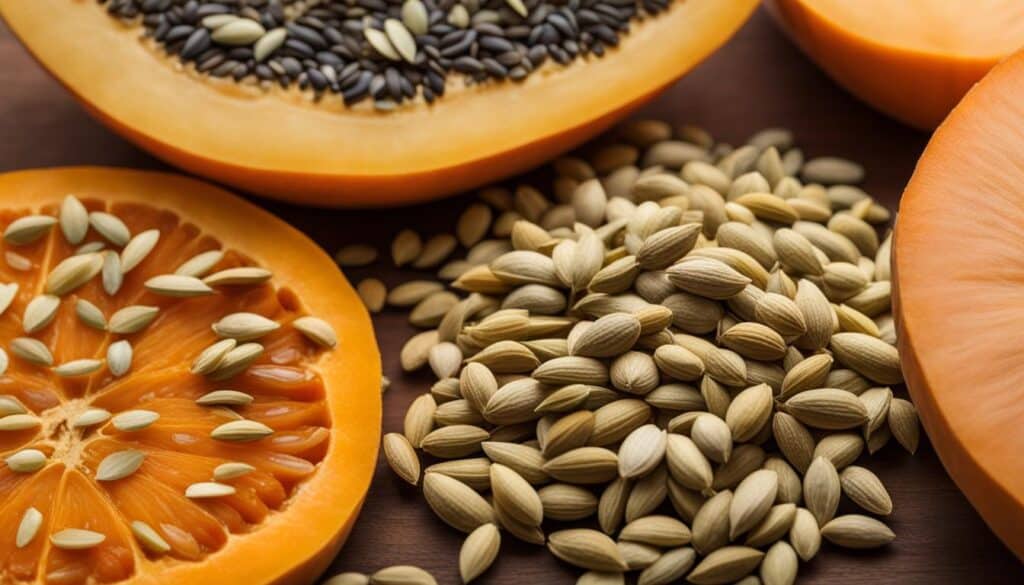
| Nutrients | Pumpkin Seeds (per 1 ounce) | Melon Seeds (per 1 ounce) |
|---|---|---|
| Protein | 9 grams | 5 grams |
| Fiber | 2.3 grams | 1.7 grams |
| Iron | 2.5 milligrams | 1.2 milligrams |
| Magnesium | 168 milligrams | 137 milligrams |
| Zinc | 2.2 milligrams | 2.3 milligrams |
Note: The nutrient composition may vary based on the specific variety and preparation method.
The Power of Poppy Seeds
Poppy seeds, native to the Middle East, are a nutritional powerhouse with an array of health benefits. These tiny seeds are packed with essential nutrients, including omega-3 fatty acids, iron, copper, calcium, potassium, manganese, zinc, and magnesium. They are also rich in dietary fiber, which promotes healthy digestion and supports regular bowel movements.
Incorporating poppy seeds into your diet can have numerous positive effects on your well-being. The high levels of calcium and manganese in poppy seeds are essential for promoting bone health and supporting the development and maintenance of strong bones and teeth. Additionally, the iron content in these seeds plays a crucial role in maintaining proper oxygen transportation throughout the body, enhancing energy levels and preventing iron-deficiency anemia.
Poppy seeds are a versatile ingredient and can be used in a variety of recipes. Their nutty and slightly sweet flavor adds a unique twist to baked goods, salads, and savory dishes. You can sprinkle poppy seeds on top of bread, muffins, and cookies or add them to dressings and marinades for an extra burst of taste and texture.
With their exceptional nutritional profile and culinary versatility, poppy seeds are a great addition to any diet. Whether you’re looking to enhance your meals or reap the health benefits they offer, incorporating poppy seeds into your daily routine can be a simple and delicious way to boost your overall well-being.
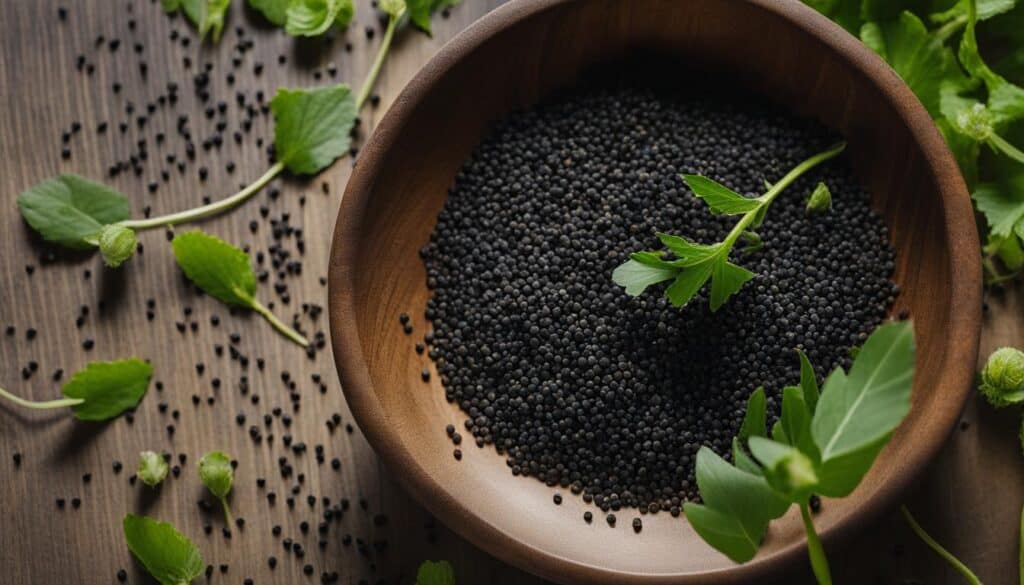
Nutritional Profile of Poppy Seeds
| Nutrient | Amount per 100g |
|---|---|
| Omega-3 Fatty Acids | 22.5g |
| Iron | 9.8mg |
| Copper | 1.6mg |
| Calcium | 1,440mg |
| Potassium | 719mg |
| Manganese | 213mg |
| Zinc | 10.2mg |
| Magnesium | 346mg |
The History of Poppy Seeds
Poppy seeds have a fascinating history that traces back to ancient times. These tiny, oil-rich seeds have been cultivated and used for various purposes for centuries. Let’s explore the intriguing journey of poppy seeds through the ages.
Cultivation and Early Use
The cultivation of poppy seeds can be traced back to ancient civilizations such as the Egyptians, Greeks, and Romans. They were valued for their medicinal properties and were used to alleviate pain, induce sleep, and treat various ailments. Poppy seeds were also highly prized for their culinary uses and were incorporated into a wide range of dishes, including bread, pastries, and desserts.
“Poppy seeds were treasured for their health benefits and culinary versatility in ancient civilizations.”
Trade and Global Spread
In the Middle Ages, poppy seeds gained popularity as a trade commodity, particularly in regions such as Asia, Europe, and the Middle East. The Silk Road played a significant role in the expansion of poppy seed cultivation and trade, leading to their widespread availability and usage in diverse cultures and cuisines.
During the colonial era, the British India Company played a crucial role in the cultivation of opium poppies in India. While the focus was primarily on opium production for trade with China, the cultivation of poppy seeds also thrived. However, the negative consequences of this trade, including drug addiction and social issues, led to increased regulations and control over opium production.
Modern Uses and Cultivation
Today, poppy seeds continue to be cultivated and used globally. They are valued not only for their unique flavor and texture but also for their nutritional benefits. Poppy seeds are a rich source of essential nutrients such as omega-3 fatty acids, minerals like calcium and magnesium, and dietary fiber.
While poppy seeds have a long history and diverse cultural significance, it’s important to note that their cultivation and use should be approached with caution and in compliance with legal and regulatory frameworks. It’s essential to be aware of local laws and restrictions regarding the cultivation and consumption of poppy seeds in different countries.
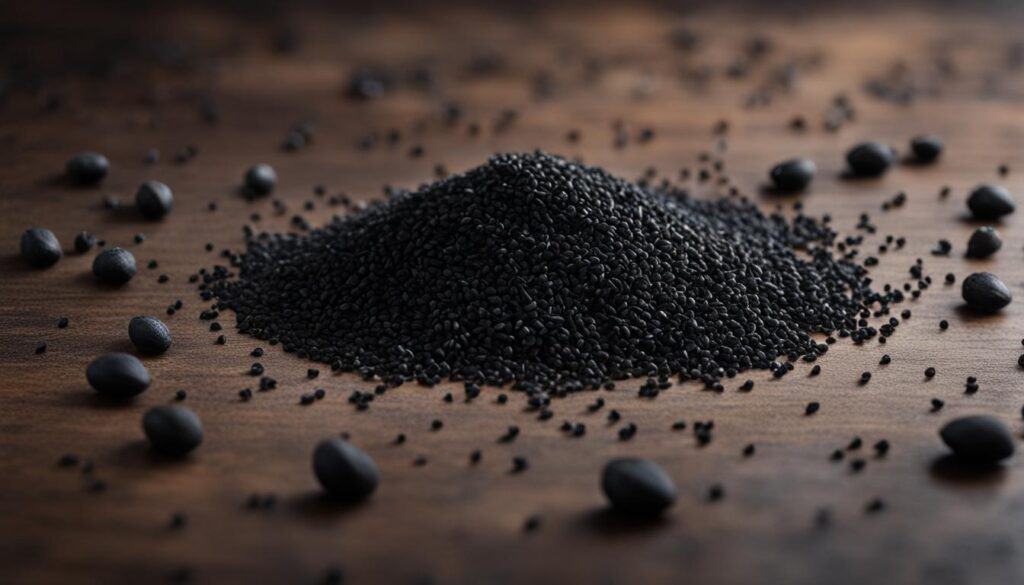
| Period | Key Highlights |
|---|---|
| Ancient Times | Cultivation and use of poppy seeds by ancient civilizations for medicinal and culinary purposes. |
| Middle Ages | Poppy seeds gain popularity as a trade commodity along the Silk Road, leading to their global spread. |
| Colonial Era | British India Company’s involvement in opium poppy cultivation in India, alongside poppy seed production. |
| Modern Times | Poppy seeds continue to be cultivated and used globally for their unique flavor and nutritional benefits. |
The Importance of Organic Farming
Organic farming plays a crucial role in ensuring the health and vitality of our soil, which in turn has a profound impact on the quality of the seeds we consume. By embracing organic farming practices, we can protect and promote soil health, leading to thriving plants and seeds that are rich in essential nutrients. Unlike conventional farming methods that rely on synthetic pesticides and fertilizers, organic farming focuses on using natural and sustainable techniques to nurture the soil and enhance its fertility.
One of the key advantages of organic farming is its ability to preserve the biodiversity of the soil. By avoiding the use of harmful chemicals, organic farmers create an environment that encourages the growth of beneficial microorganisms, earthworms, and other organisms that contribute to soil fertility. This biodiversity not only helps to improve soil structure but also aids in nutrient cycling and water retention, promoting the overall health of the ecosystem. Organic farming also reduces the risk of chemical residues in seeds, ensuring that the seeds we consume are free from harmful substances.
Furthermore, organic farming practices prioritize the long-term sustainability of agricultural systems. Through crop rotation, cover cropping, and the use of organic fertilizers, organic farmers replenish soil nutrients naturally and minimize soil erosion. These practices also help to sequester carbon, mitigating the impacts of climate change. By supporting organic farming and choosing organic seeds, we can contribute to the preservation of our environment and promote a healthier and more sustainable future.
The Benefits of Organic Farming:
- Promotes soil health and biodiversity.
- Reduces the risk of chemical residues in seeds.
- Enhances nutrient cycling and water retention.
- Minimizes soil erosion and sequesters carbon.
By prioritizing organic farming methods and supporting farmers who embrace these practices, we can ensure that the seeds we consume are of the highest quality and provide us with optimal nutrition and health benefits. By making conscious choices, we can protect our environment, promote sustainable agriculture, and ultimately improve our own well-being.

Conclusion
Incorporating muskmelon seeds into your diet is a simple yet effective way to unlock numerous health benefits. Whether you choose to enjoy them in fresh fruit salads, smoothies, or as a seasoning agent in dishes, muskmelon seeds provide essential nutrients like vitamin C, vitamin A, fiber, and potassium. These nutrients contribute to overall well-being and support various bodily functions.
Additionally, exploring other seeds like pumpkin, melon, and poppy can further diversify your nutritional intake. Pumpkin and melon seeds offer a plethora of essential nutrients such as iron, copper, omega-3, and proteins, while poppy seeds are rich in dietary fiber and minerals like calcium, potassium, and magnesium.
Embrace the power of these super seeds and experience the positive impact they can have on your overall wellness. By incorporating these nutrient-dense seeds into your meals and snacks, you can enhance the nutritional value of your diet and support your health in multiple ways. Remember to choose organic whenever possible for optimal health and to support sustainable farming practices that prioritize soil health and the absence of chemical residues.
FAQ
What are muskmelons?
Muskmelons, scientifically known as Cucumis melo, are a type of melon that comes in various varieties such as cantaloupes, honeydews, and casabas. They are known for their fragrant aroma and sweet, juicy flesh.
What nutrients are found in muskmelon seeds?
Muskmelon seeds are packed with essential nutrients such as vitamin C, vitamin A, dietary fiber, and potassium. They also provide vitamin K, folate, and magnesium, contributing to overall health and well-being.
What are the health benefits of muskmelon seeds?
Muskmelon seeds promote hydration, weight management, heart health, skin health, immune function, and digestion. They are a nutritional powerhouse that can significantly improve your overall well-being.
How can I incorporate muskmelon seeds into my diet?
You can add muskmelon seeds to fresh fruit salads, blend them into smoothies and juices, grill them as skewers, make muskmelon salsa, or create refreshing muskmelon sorbet. The possibilities are endless!
Are pumpkin and melon seeds beneficial for health?
Yes, both pumpkin and melon seeds are packed with essential nutrients such as iron, copper, omega-3, manganese, phosphorus, magnesium, zinc, and proteins, offering numerous health benefits.
What are the health benefits of poppy seeds?
Poppy seeds are rich in omega-3, iron, copper, calcium, potassium, manganese, zinc, and magnesium. They promote healthy bodily functions and are commonly used as a seasoning agent in various cuisines.
What is the history of poppy seeds?
Poppy seeds have a rich history, particularly in India where they are actively cultivated. In the past, they were used for opium production, which had negative impacts on small farmers and food security. However, poppy seeds themselves are a healthy and nutritious superfood.
Why is organic farming important?
Organic farming focuses on soil health, ensuring that plants and their seeds reflect rich nutrients and are free from chemical residues. Choosing organic seeds and supporting organic farming practices can lead to thriving plants and seeds that offer optimal nutrition and health benefits.

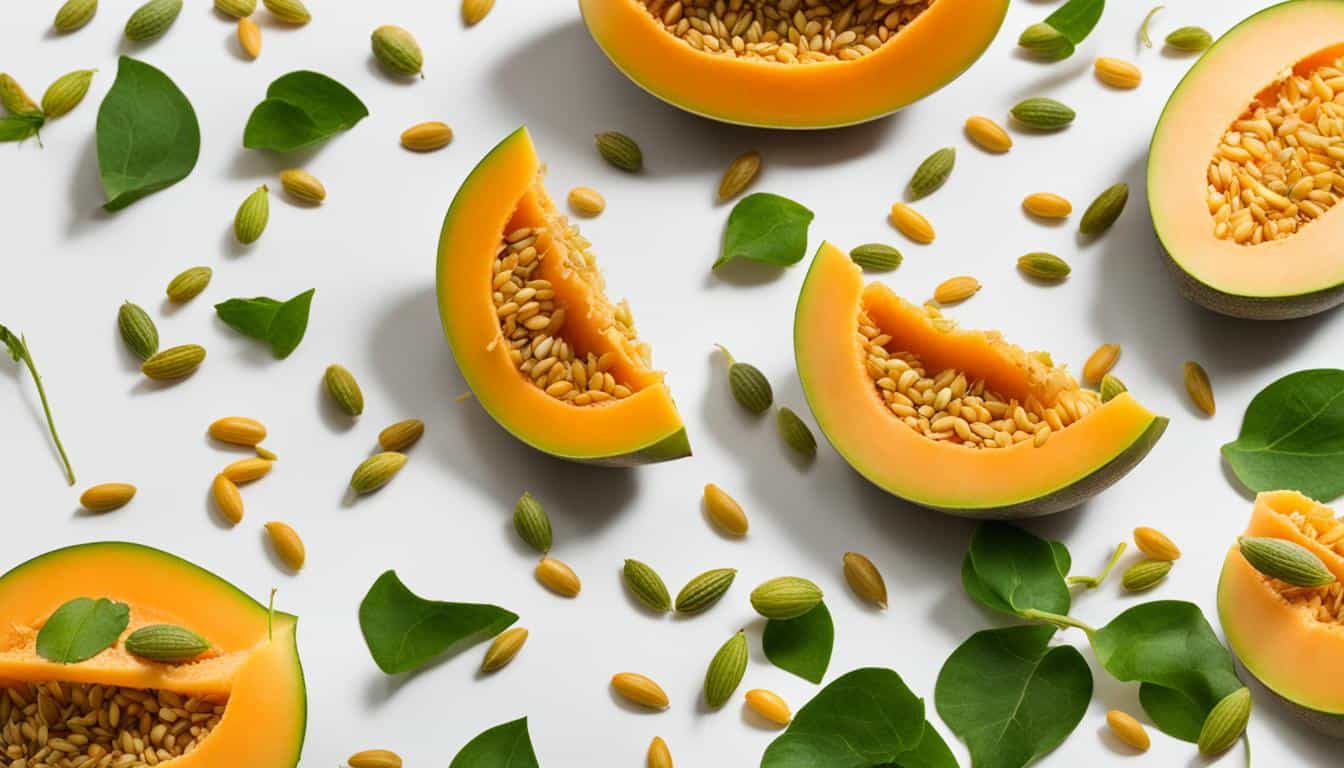



Leave a Reply